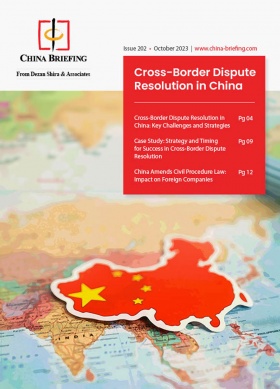Xi-Biden Meeting: “Productive” Talks Lead to Increased Cooperation in Key Areas
A long-anticipated meeting between President Xi Jinping and President Joe Biden in San Francisco has led to commitments to increase bilateral cooperation in several key areas, including counternarcotics, AI governance, and military affairs. This is the highest-level US-China meeting since the two heads of state met in Bali, Indonesia almost exactly one year ago, and is the result of a months-long effort to stabilize ties. The meeting sets “a new starting point” for the relationship, with the hope of more collaboration to come.
On November 15, 2023, Chinese President Xi Jinping and US President Joe Biden held their first face-to-face meeting in a year at the Filoli Estate in San Francisco. This is only the second time the two leaders have met during Biden’s term as president, although the two have previously met several times in other official capacities.
The four-hour meeting, which took place on the sidelines of the APEC Summit, is the culmination of many months of concerted efforts and high-level meetings between officials to improve US-China ties.
In remarks given ahead of the meeting, both leaders emphasized the importance of the bilateral relationship, with Xi calling it “the most important bilateral relationship in the world”.
According to Biden, the meeting was “among the most constructive and productive we’ve had” and that they had made “important progress” in key areas.
The meeting resulted in the establishment of several areas of cooperation, including artificial intelligence (AI) governance, counternarcotics, and defense, as well as commitments to improving transport links and expanding educational and cultural exchanges between the two countries.
Xi Jinping will also attend the APEC Economic Leaders’ Informal Dialogue on November 16.
Dialogue on key issues
Setting the basic principles of US-China relations
According to a readout of the meeting from the Chinese foreign ministry, Xi set out China’s “five pillars” upon which to build the relationship going forward.
These are:
- Jointly developing the “right perception” of the relationship: China is consistently committed to having a stable, healthy, and sustainable relationship with the US, but must safeguard its interests and principles, and adhere to its red lines.
- Effectively managing disagreements: The two sides should look for ways to build bridges, respect each other’s principles and red lines, and refrain from provocative behavior and crossing these lines. They should have more communications, dialogues, and consultations, and calmly handle their differences and any incidents.
- Advancing mutually beneficial cooperation: China and the US have broad areas of common interest, such as the economy, trade, agriculture, climate change, and AI. The two sides should fully utilize the mechanisms in foreign policy, the economy, finance, commerce, and agriculture that have been restored or established in recent months to cooperate in such areas as counternarcotics, judicial and law enforcement affairs, AI, and science and technology.
- Jointly shouldering responsibilities as major countries: China and the US should lead by example, step up coordination and cooperation on international and regional issues, and provide more public good for the world.
- Promoting people-to-people exchanges: The two sides should increase scheduled flights, advance tourism cooperation, expand subnational exchanges, strengthen cooperation in education and disability affairs, and reduce negative factors hindering people-to-people exchanges.
Meanwhile, Biden is reported to have reaffirmed the five commitments he made during his meeting with Xi in Bali one year ago: that the US does not seek a new Cold War, does not seek to change China’s system, does not seek to revitalize its alliances against China, does not support “Taiwan independence”, and has no intention of engaging in a conflict with China.
Engagement in trade controls and sanctions
While there were no explicit outcomes from the meeting on the issue of trade sanctions and controls, Xi raised the issue, stating that the US’ export controls, investment reviews, and unilateral sanctions against China have “seriously damaged China’s legitimate interests”.
Over the last several years, the US has imposed trade tariffs on Chinese goods, sanctions against Chinese companies and individuals, and export controls on key products and technologies to China. China has imposed several retaliatory measures.
In October 2022, the US imposed sweeping export controls on components and technologies related to advanced computing and semiconductors to China. In July of 2023, China imposed retaliatory export restrictions on key metals for the production of semiconductors.
The US has also added several Chinese companies and business people to the “Entity List”, which limits US companies’ engagement with them. China has also added several US companies to the “Unreliable Entities List”.
In reference to these actions, Xi stated that the US’ “suppression of China’s science and technology is to curb China’s high-quality development and deprive the Chinese people of their right to development”, and called for the US to lift the sanctions against China.
According to the White House readout, Biden emphasized that the US “will continue to take necessary actions to prevent advanced U.S. technologies from being used to undermine our own national security, without unduly limiting trade and investment”.
Agreements on bilateral cooperation
Cooperation on counternarcotics
Although few details have been released on each item, the meeting resulted in commitments to improve cooperation in several important areas.
One of these is an agreement to step up bilateral cooperation to counter the “evolving” trade and manufacturing of illegal drugs, in particular fentanyl, a synthetic opiate that is at the center of the US’ domestic opioid epidemic.
The issue of the fentanyl trade, and the trade in equipment and materials enabling its manufacture, has become a major area of contention between the two countries in recent years. The US alleges that much of the illegal supply of fentanyl into the US is directly or indirectly enabled by China, and has sanctioned several Chinese companies and individuals for their alleged involvement. China has repeatedly denied these claims.
China and the US have previously collaborated on counternarcotics work. In 2019, China took a major step in preventing the flow of fentanyl from China into the US by regulating a wide range of fentanyl substances. However, according to Biden, the trade has “evolved” to chemical ingredients and pill presses used for the production of fentanyl.
However, in August 2022, cooperation was suspended in retaliation to then-Speaker of the House of Representatives Nancy Pelosi’s visit to Taipei.
To this end, the two sides agreed to set up a working group “for ongoing communication and law enforcement coordination on counternarcotics issues”, per the White House readout. Biden stated that this cooperation will help to advance the US’ efforts to “counter the evolving threat of illicit synthetic drugs and to reduce the diversion of precursor chemicals and pill presses to drug cartels”.
In a press briefing after the meeting, Biden hailed the latest development, stating that it will “save lives”.
Cooperation on AI governance
The two sides have officially agreed to establish government talks on AI, although little detail has been provided on what these talks will entail.
The leaders affirmed the need to address the risks of advanced AI systems and improve AI safety through U.S.-China government talks.
The US and China have been working to establish an official channel for dialogue on AI governance since at least US Treasury Secretary Janet Yellen’s visit to Beijing in July 2023.
AI has also been an area of disagreement between the US and China, with the US seeking to limit China’s AI industry development as part of its export controls on US technologies and products. Reaching agreements on the development direction and regulation of the AI industry, such as the limits on the use of AI for military purposes, could help to reinstate industry collaboration between the two countries.
China and the US both agreed to the Bletchley Declaration at the AI Safety Summit held at the beginning of November in the United Kingdom, which outlined the potential dangers of AI and resolved to cooperate on the safe development of the technology.
Reestablishment of military dialogue
A crucial outcome of the Xi-Biden is the resumption of military-to-military talks and communication channels.
As part of the fallout of Pelosi’s visit to Taipei in August 2022, China canceled three crucial military dialogues: China-US theater commander talks, China-US defense policy coordination talks, and China-US Military Maritime Consultative Agreement (MMCA) meetings.
The two leaders have now welcomed the resumption of high-level military-to-military dialogue, as well as the US-China Defense Policy Coordination Talks and the MMCA. According to the White House, both sides are also resuming telephone conversations between theater commanders.
The improvement of military dialogue is an important step toward stabilizing bilateral relations and will greatly help to reduce the possibility of misunderstandings or conflict, particularly in the South China Sea where both countries carry out military exercises.
US Defense Secretary Lloyd Austin is also expected to meet with his Chinese counterpart once a new Chinese defense minister has been appointed, according to media reports.
Increase in passenger flights
Per the White House readout, the two leaders “committed to work towards a significant further increase in scheduled passenger flights early next year”.
Passenger flights between the US and China have not yet returned to pre-COVID levels, despite the lifting of travel restrictions in early 2023. The number of passenger flights has been raised several times in 2023, most recently in October, when the US Department of Transport approved an increase to the number of roundtrip flights to the US that Chinese airlines could operate per week. This brought the total number of weekly flights operated by US and Chinese airlines to 70 from November 9, 2023.
In addition to increasing passenger flights, the two sides also “encouraged the expansion of educational, student, youth, cultural, sports, and business exchanges”.
Cooperation on climate change
Xi and Biden both acknowledged the importance of cooperation on climate action, and “welcomed recent positive discussions between their respective special envoys for climate”.
The two leaders underscored the importance of working together to accelerate efforts to tackle the climate crisis in this critical decade.
The day before their meeting, the US and China released a joint statement outlining 25 points of agreement on jointly tackling the climate crisis. The statement followed meetings between US and Chinese climate envoys in California earlier in November.
The statement included joint commitments to implement the Paris Agreement, triple renewable energy capacity globally by 2030, implement respective national methane action plans, implement technologies and measures to control greenhouse gas (GHG) emissions and air pollutants and support climate cooperation between states, provinces, and cities in each country.
Continuing bilateral dialogue
The US and China both agreed to maintain open lines of communication and continue high-level meetings between officials, which will include “visits in both directions and ongoing working-level consultations in key areas, including on commercial, economic, financial, Asia-Pacific, arms control and nonproliferation, maritime, export control enforcement, policy-planning, agriculture, and disability issues”.
As stated in the readout of the Chinese foreign ministry, “San Francisco should be a new starting point for stabilizing China-US relations”.
The two leaders also agreed “to continue their regular contact”.
To keep up with the latest developments in US-China relations, see our Timeline of US-China Relations in the Biden Era.
About Us
China Briefing is written and produced by Dezan Shira & Associates. The practice assists foreign investors into China and has done so since 1992 through offices in Beijing, Tianjin, Dalian, Qingdao, Shanghai, Hangzhou, Ningbo, Suzhou, Guangzhou, Dongguan, Zhongshan, Shenzhen, and Hong Kong. Please contact the firm for assistance in China at china@dezshira.com.
Dezan Shira & Associates has offices in Vietnam, Indonesia, Singapore, United States, Germany, Italy, India, Dubai (UAE), and Russia, in addition to our trade research facilities along the Belt & Road Initiative. We also have partner firms assisting foreign investors in The Philippines, Malaysia, Thailand, Bangladesh.
- Previous Article The 2023 Xi-Biden Meeting: A Summary of the Discussions and Future Trends
- Next Article China-América Latina y el Caribe: inversión, comercio y perspectivas futuras








